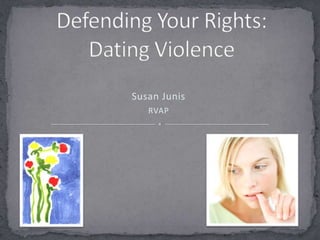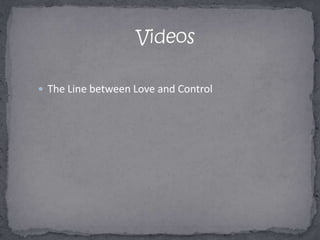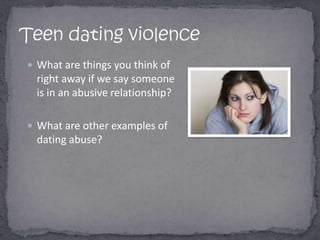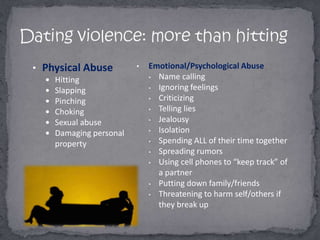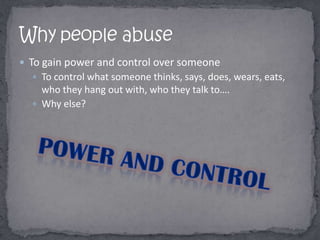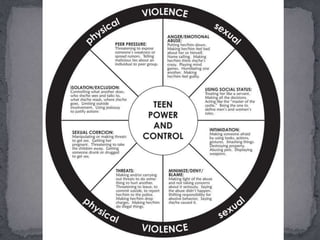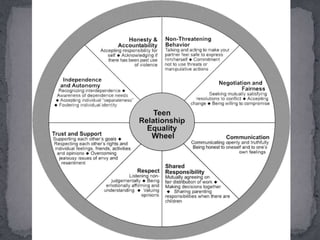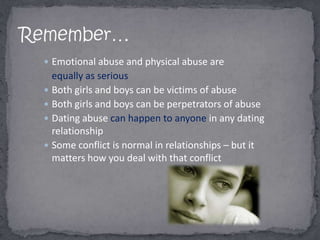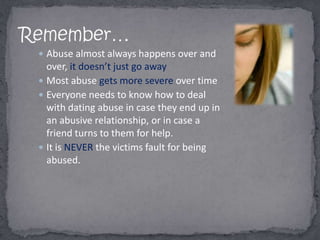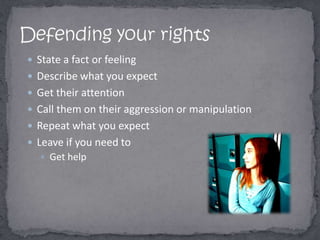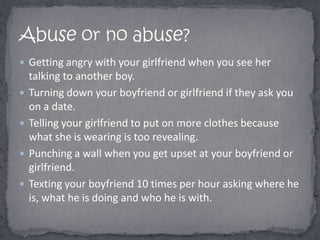NCJH day 3
- 1. Susan Junis RVAP
- 2. The Line between Love and Control
- 3. What are things you think of right away if we say someone is in an abusive relationship? What are other examples of dating abuse?
- 4. • Physical Abuse • Emotional/Psychological Abuse Hitting • Name calling Slapping • Ignoring feelings Pinching • Criticizing Choking • Telling lies Sexual abuse • Jealousy Damaging personal • Isolation property • Spending ALL of their time together • Spreading rumors • Using cell phones to “keep track” of a partner • Putting down family/friends • Threatening to harm self/others if they break up
- 5. To gain power and control over someone To control what someone thinks, says, does, wears, eats, who they hang out with, who they talk to…. Why else?
- 9. 1 in 3 teens experience some kind of abuse in their romantic relationships, including verbal & emotional abuse. (BreaktheCycle.org) 59% of students who are currently dating have been abused physically and 96% have been abused emotionally. (Safe Dates) Nearly 80% of girls who have been physically abused in their intimate relationships continue to date their abuser. (BreaktheCycle.org) 1 in 3 teens report they are text-messaged 10, 20, or 30 times an hour by a partner inquiring where they are, what they’re doing, or who they’re with. (LoveIsNotAbuse.org)
- 10. Emotional abuse and physical abuse are equally as serious Both girls and boys can be victims of abuse Both girls and boys can be perpetrators of abuse Dating abuse can happen to anyone in any dating relationship Some conflict is normal in relationships – but it matters how you deal with that conflict
- 11. Abuse almost always happens over and over, it doesn’t just go away Most abuse gets more severe over time Everyone needs to know how to deal with dating abuse in case they end up in an abusive relationship, or in case a friend turns to them for help. It is NEVER the victims fault for being abused.
- 12. State a fact or feeling Describe what you expect Get their attention Call them on their aggression or manipulation Repeat what you expect Leave if you need to Get help
- 13. Getting angry with your girlfriend when you see her talking to another boy. Turning down your boyfriend or girlfriend if they ask you on a date. Telling your girlfriend to put on more clothes because what she is wearing is too revealing. Punching a wall when you get upset at your boyfriend or girlfriend. Texting your boyfriend 10 times per hour asking where he is, what he is doing and who he is with.
- 14. Talking on the phone with your friend for an hour instead of hanging out with your boyfriend or girlfriend. Making your boyfriend clean your room because your mother won’t do it for you. Refusing to date someone because you are not ready to date. Calling your boyfriend or girlfriend and threatening suicide if he or she breaks up with you. Pressuring your partner to make out with you, telling them that if they really loved you they would do it.
- 15. Services • 24-hour Rape Crisis Line • 800.284.7821 • Medical, Legal and School Advocacy • Counseling • Support • Information

